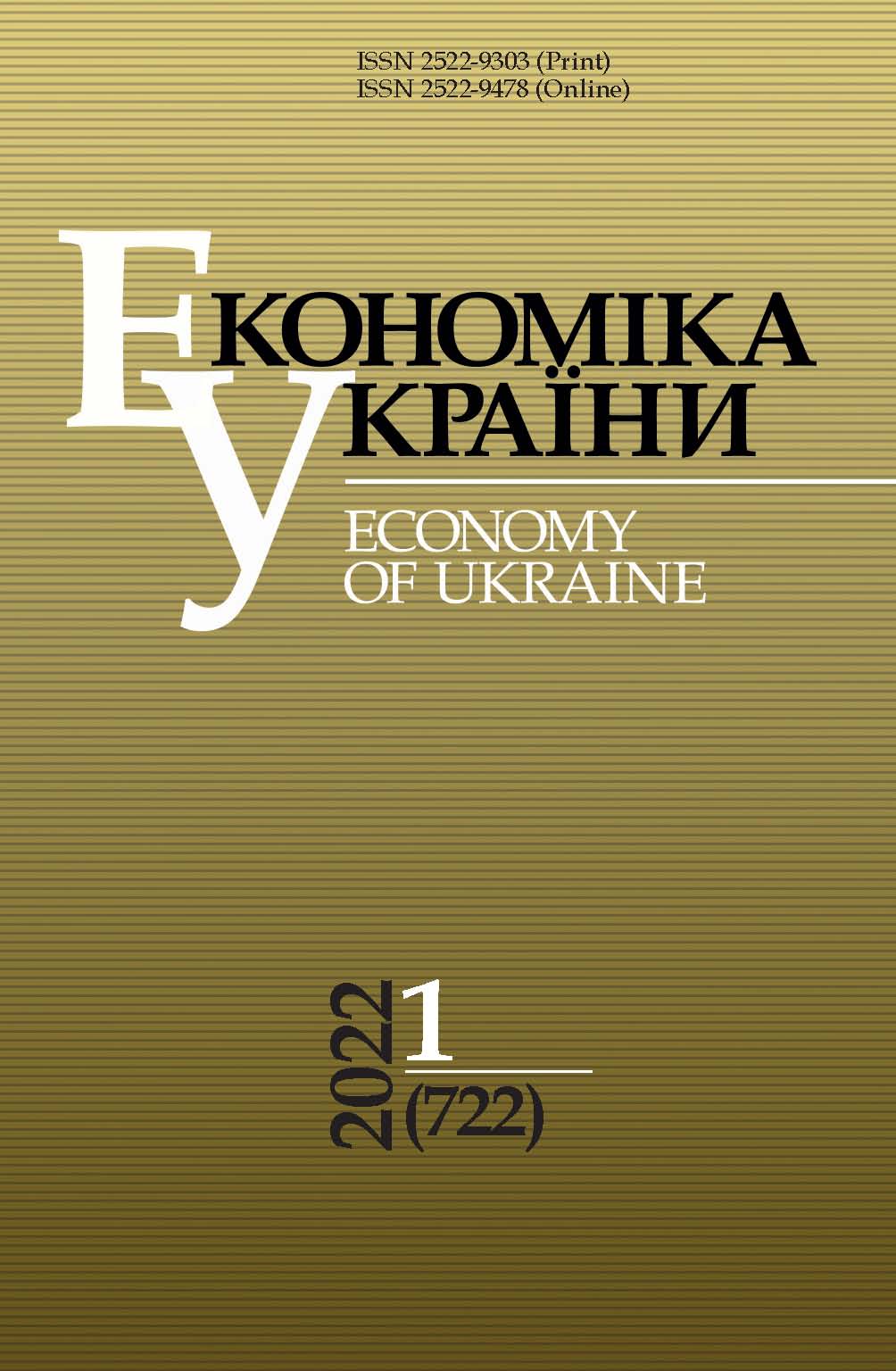ЦИФРОВІ ТЕХНОЛОГІЇ ТА ПРОБЛЕМИ РОЗВИТКУ ПРОМИСЛОВОСТІ
DOI:
https://doi.org/10.15407/economyukr.2022.01.047Ключові слова:
смарт-промисловість; Індустрія 4.0; цифрові технології; кіберфізичні виробничі системи; роботизація; промислова політика.Анотація
Важливими довгостроковими трендами у сфері світової смарт-промисловості є прискорений розвиток кіберфізичних виробничих систем і роботизація виробництва. Виконаний аналіз показав, що Україна суттєво відстає в упровадженні цих технологій. Вона є однією з перших у світі за розвитком цифрових фінансових інструментів і однією з останніх – за розвитком кіберфізичного виробництва. Це означає, що в довгостроковій перспективі країна продовжить втрачати свої конкурентні позиції у світі. Одна з головних причин такого становища полягає в тому, що економічні правила гри в державі прив'язано до короткострокових політичних циклів, що заважає «довгим» інвестиціям та інноваційній діяльності.
Потрібно розірвати ланцюжок негативних причинно-наслідкових зв'язків "застарілі технології – низькі доходи – подальший занепад" і негативного відбору "найбільш пристосованих" до умов «коротких» політичних циклів. Один з дієвих методів вирішення цієї проблеми, добре відомий із світової практики, – проведення проактивної національно орієнтованої промислової політики. Саме вона допомогла Південній Кореї, Китаю та деяким іншим державам здійснити перехід до прискореного індустріального розвитку на основі інновацій та впровадження кіберфізичних систем. Але це дуже непростий і примхливий метод, використання якого чревате провалами політики через недостатню поінформованість уряду, своєкорисливу поведінку чиновників, їх нездатність протистояти галузевим лобістам, інтересантам інших держав тощо.
Проте в умовах початкового етапу промислової революції, який відкриває певне "вікно можливостей" для зацікавлених сторін, незважаючи на всі ці ризики, багато урядів не шкодують зусиль і грошей для просування новітніх виробничих смарт-технологій, оскільки від них залежить майбутнє національної безпеки і конкурентоспроможності. Приблизно в цьому напрямі потрібно рухатись і Україні, розмежовуючи «довгі» економічні інтереси держави і «короткі» інтереси політичної кон'юнктури.
Посилання
MacDougall W. INDUSTRIE 4.0: Smart Manufacturing for the Future. Berlin, Germany Trade & Invest, 2014.
Hauser H. The Struggle for Technology Sovereignty in Europe. Project Syndicate, March 31, 2021, available at: www.project-syndicate.org/commentary/europe-technology-sovereignty-imperative-by-hermann-hauser-2021-03
Malmkvist L., Sachse J., Beurle D. The future of manufacturing - Building the future through agility and innovation. Future-iQ, 2016, available at: www.aedg.org/wp-content/uploads/Future-iQ-Partners-Future-of-Manufacturing.pdf
Kautzsch T., Kronenwett D., Thibault G. Megatrends and the future of industry: A new era in manufacturing presents long-term opportunities. Oliver Wyman, 2017, available at: www.oliverwyman.com/content/dam/oliver-wyman/v2/publications/2017/nov/Megatrends_And_The_Future_Of_Industry.pdf
Moore G. Cramming More Components onto Integrated Circuits. Proceedings of the IEEE, 1998, Vol. 86 (1), pр. 82-85, available at: www.cs.utexas.edu/~fussell/courses/cs352h/papers/moore.pdf
doi.org/10.1109/JPROC.1998.658762
Hilbert M., Lopez P. The World's Technological Capacity to Store, Communicate, and Compute Information. Science, 2011, Vol. 332, pp. 60-65.
doi.org/10.1126/science.1200970
Reinsel D., Gantz J., Rydning J. The Digitization of the World. From Edge to Core. IDC White Paper I., 2020, available at: www.seagate.com/files/www-content/our-story/trends/files/idc-seagate-dataage-whitepaper.pdf
Schwab K. The Fourth Industrial Revolution. World Economic Forum, Geneva, Switzerland, 2016, available at: www.weforum.org/about/the-fourth-industrial-revolution-by-klaus-schwab
Madykh A., Okhten O. Modeling the transformation of the impact of production factors on the economy in the process of smart industry formation. Economy of Industry, 2018, No. 4 (84), pp. 26-41 [in Russian].
doi.org/10.15407/econindustry2018.04.026
Vishnevsky V., Harkushenko O., Zanizdra M. et al. Digitalization of the economy: how to improve the country's competitiveness. V.P. Vishnevsky, S.I. Kniaziev (Eds.). NAS of Ukraine, Institute of Industrial Economics, Kyiv, Akademperiodyka, 2021.
doi.org/10.15407/akademperiodyka.435.168
Harrison L. Jews, Confucians, and Protestants: Cultural Capital and the End of Multiculturalism. Moscow, Mysl, 2014 [in Russian].
North D., Wallis J., Weingast B. Violence and Social Orders: A Conceptual Framework for Interpreting Recorded Human History. Moscow, Publisher of the Gaidar Institute, 2011 [in Russian].
Acemoglu D., Robinson J. Why Nations Fail: The Origins of Power, Prosperity, and Poverty. Moscow, AST, 2015 [in Russian].
Polterovich V.M. Towards a general theory of socio-economic development. Part 1. Geography, institutions, or culture? Voprosy Ekonomiki, 2018, No. 11, pp. 5-26 [in Russian].
doi.org/10.32609/0042-8736-2018-11-5-26
Balatskiy E. The principle of consistency in social development theory. Terra Economicus, 2021, No. 19 (1), pp. 36-52 [in Russian].
doi.org/10.18522/2073-6606-2021-19-1-36-52
Lin J. Industrial Policy Comes Out of the Cold. Project Syndicate, December 1, 2010, available at: www.project-syndicate.org/commentary/industrial-policy-comes-out-of-the-cold
Murphy L.M., Edwards P.L. Bridging the Valley of Death: Transitioning from Public to Private Sector Financing. Colorado, National Renewable Energy Laboratory, 2003.
Reinert E.S. How Rich Countries Got Rich and Why Poor Countries Stay Poor. V. Avtonomov (Ed.). National Research University Higher School of Economics, 4th edition, Moscow, Publishing House of the Higher School of Economics, 2016 [in Russian].
Lee J. The Global War for 5G Heats up. The Diplomat, July 31, 2020, available at: thediplomat.com/2020/08/the-global-war-for-5g-heats-up/
Kniaziev S. Experience of European smart industry development. Economy of Industry, 2021, No. 2 (90), pp. 27-53 [in Russian].
doi.org/10.15407/econindustry2020.02.027
Сhernoutsan E. French industrial policy: Digital challenges. Current Problems of Europe, 2021, No. 3 (111), pp. 28-53 [in Russian].
doi.org/10.31249/ape/2021.03.02
Moreno L. Getting Industrial Policy Right. Project Syndicate, January 23, 2015, available at: www.project-syndicate.org/commentary/latin-america-industrial-policy-failures-by-luis-a--moreno-2015-01
Rodrik D. The Return of Industrial Policy. Project Syndicate, April 12, 2010, available at: www.project-syndicate.org/commentary/the-return-of-industrial-policy-2010-04
Stark D., Pais I. Algorithmic Management in the Platform Economy. Economic Sociology, 2021, Vol. 22, No. 3, pp. 71-103 [in Russian].
doi.org/10.17323/1726-3247-2021-3-71-103
##submission.downloads##
Опубліковано
Як цитувати
Номер
Розділ
Ліцензія
Авторське право (c) 2024 Економіка України

Ця робота ліцензується відповідно до Creative Commons Attribution-NonCommercial-NoDerivatives 4.0 International License.



